Revolving Around Revolutions
A Sneak Peek at UCSB’s 7th Annual Human Rights Film Festival
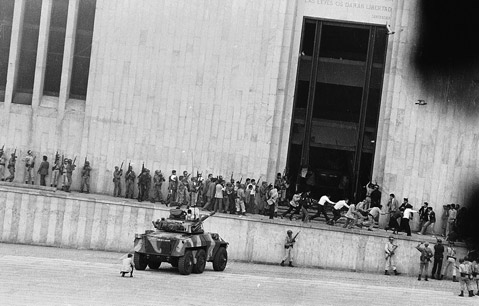
For the seventh year in a row, UCSB’s Arts & Lectures will put the world’s various struggles for freedom, equality, and justice on the big screen under the banner of the Human Rights Film Festival, our town’s annual chance to learn about the plights of people we’ve either forgotten or never known about. This year’s fest, which is copresented by UCSB’s Carsey-Wolf Center, should have been subtitled “The Revolutionary Edition,” as nearly every one of the 12 selections deals in some way with political or social uprisings that are already underway or should be in the near future.
Even this year’s changed setting (the campus’s nearly brand-new Pollock Theater) and format (six separate double screenings, shown sporadically from Apr. 9-May 9) rebel against the past, although fest curator Roman Baratiak recently admitted, “We’ve never quite gotten the formula settled. It has not been consistent really at all.” The challenge is squeezing these must-see movies in between A&L’s live programming, which is increasingly jam-packed, especially in the spring. But the new venue was a no-brainer. “I’m quite excited to be showing the films at the Pollock,” said Baratiak. “This is a great theater, designed specifically for film and new media. The quality of the projection is terrific, the sound is great, and there’s significant lobby space where we are able to do receptions between screenings. It’s just perfect for showing film.”
What hasn’t changed are two central points, one good, one bad. The bad: that the American government seems to evermore be the villain, or at least aid the villain, in these documentaries. “Many of them are critical of U.S. involvement around the world in many situations that seem to be antithetical to America’s interests and stated values,” agreed Baratiak. “These filmmakers are trying to expose this because it’s problematic.”
The good: that Santa Barbara remains a perfect audience for these types of eye-opening films. “We live in a very progressive community,” said Baratiak. “We live in a community that is unique, frankly — we have a local chapter committee that supports Human Rights Watch, which is unheard of for a town of this size.”
What follow are mini-reviews of the films being screened on Monday, April 9, and Wednesday, April 11. For a look at the films on April 23, April 25, May 7, and May 9, visit independent.com/hr, or look to our newspaper’s Movie Guide in the coming weeks.
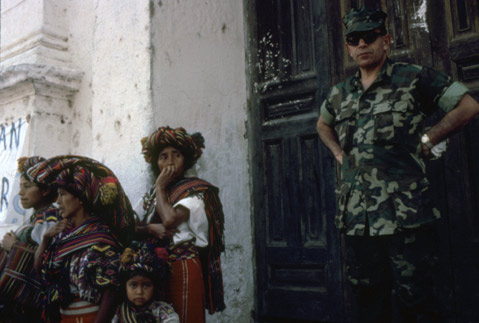
Monday, April 9
Granito — How to Nail a Dictator at 7 p.m.
When young filmmaker Pamela Yates ventured to Guatemala in 1982 in search of a documentary, she stumbled upon one of Central America’s most brutal — and most deftly hidden — civil wars. The conflict left 200,000 dead and disappeared bodies in its wake, and it resulted in the award-winning film When the Mountains Tremble, which introduced Nobel Prize winner Rigoberta Menchú to the world. A quarter-century later, as an international team of investigators and attorneys attempt to charge those responsible with genocide, Yates dives back into her old footage to tease out evidence. That process sends her on a path of rediscovery and resolution, rekindles relationships with revolutionaries of yesteryear, and leaves viewers inspired, enraged, and aghast of the war that was.
The Siege (La toma) at 9 p.m.
Another modern trial to resolve decades-old disappearances in Latin America gets a thorough examination in this documentary about the televised November 1985 siege in the heart of Bogotá, Colombia, where a band of guerrillas violently took 350 hostages in the Palace of Justice — including the country’s highest judges. In addition to stunning footage of urban warfare about an incident you’ve probably never heard of, this film — which specifically covers the trial of a combative yet free-speaking colonel who seems in part responsible for about one dozen people who went missing that day — makes you ponder military priorities, the psychology of missing persons, and the fog of war.
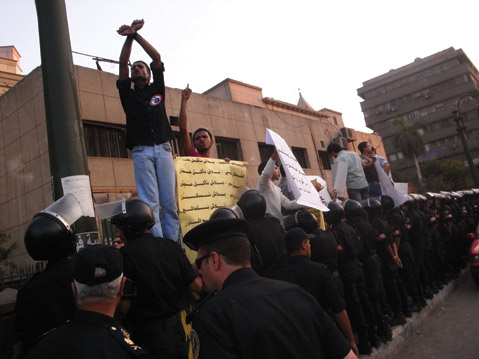
Wednesday, April 11
Goodbye Mubarak! at 7 p.m.
Despite the widespread sense that the Arab Spring broke out overnight in Egypt, this documentary shows life in Cairo, Alexandria, and elsewhere during the months that led up to the popular uprising against the Mubarak government, when, says the narrator, “All the ingredients were there for this powder keg to explode.” Following political activists, getting frank assessments of what’s wrong (namely, everyone’s poor but everything’s too expensive), and showing rampant abuses of police power and ballot rigging, this film is a powerful analysis of the Petri dish required for revolution, with some insights into why the Muslim Brotherhood might not be so bad after all.
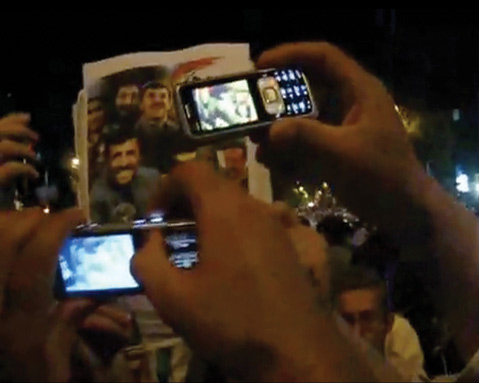
Fragments of a Revolution at 9 p.m.
A lesson in how to make an hour-long film out of scratchy Web videos, anonymous correspondence, and official propaganda, Fragments of a Revolution portrays the fervently hopeful but ultimately failed — or at least stalled — “Green Movement” in Iran. Based on emails between friends in Tehran and Paris, our unnamed Parisian protagonist attempts to put together pieces of the revolution’s puzzle by opening and closing Web sites and YouTube videos, featuring both the on-the-street footage from activists and the hypocritical mumbo-jumbo coming from the Ayatollah and Ahmadinejad. Until Iran’s people achieve a higher level of freedom and can actually speak without fear of imprisonment, this film will stand as the most comprehensive look at that country’s ongoing fight for a more just society.
Monday, April 23
We Were Here at 7 p.m.
For gay men, San Francisco in the 1970s was nothing short of paradise, a place where acceptance was wide, hope for equality was high, and sex was frequent. But hell officially took over that heaven by the early 1980s, when a mysterious disease began killing people, sometimes within days. Though focused on that tragic time, this film manages to be an uplifting portrait of the selfless community that emerged to face down AIDS, love their fellow man, and beat back the scourge that eventually infected 50-percent of the city’s gay population. And to do that all that in the face of constant hate (via quarantine ballot measures and mandatory testing proposals) and even steadier death rates (more than 15,000 people died by 1997) makes theirs a saga that everyone on the planet can learn from. Said one of the many nurses, volunteers, and even flower dealers interviewed, “It was a response that America should be proud of.”
Better This World at 9 p.m.
What happens when two idealistic teens from Texas get coaxed into upping their progressive protest ante toward violence by a role model who turns out to be an FBI informant? Well, those kids go to federal prison, while the informant escapes squeaky clean, only to become a right-wing radio show star. That’s the gist of this must-see tale of Brad Crowder and David McKay, whose road trip — with Hurricane Katrina good guy-gone-rat Brandon Darby — to face off against the 2008 Republican National Convention in Minneapolis turned into a nightmare that they’re still living. But Better This World is not just about the deal-with-devil nature of informants — it also shows how police push peaceful protesters toward violence, how the federal plea bargain racket is unjust, and how prison turns good kids bad.
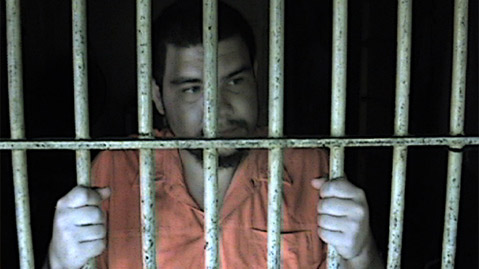
Wednesday, April 25
Give Up Tomorrow at 7 p.m.
How does a man, who 42 witnesses say was hundreds of miles away from a crime he’s being accused to committing end up on death row in the Philippines? That’s what Michael Collins’s documentary sets to find out, more than a decade after Paco Larrañaga was sentenced to life and then to death for a murder he did not commit. In addition to showing his family’s fight for freedom, the film reveals the strange case of one mother’s quest for justice in the killing of her two daughters, even if it means locking up the wrong men. Read an interview with the director here.
The Price of Sex at 9 p.m.
After leaving Bulgaria for America with the fall of the Iron Curtain, photojournalist Mimi Chakarova watched as fellow Eastern European women around her age became central players in the worldwide sex trade, tricked from their small villages into brothels from Istanbul to Dubai to Athens. This documentary is her attempt to find out how that happened. To do so, Chakarova conducts candid interviews with escaped prostitutes, wears hidden cameras to show off the inside of clandestine clubs, and, as she puts it, “enters the mouth of the wolf.” The answers aren’t easy — the stolen girls are naïve in taking jobs as waitresses, their parents rarely inquire as to their whereabouts once gone, and solutions like police raids wind up confirming the prostitutes’ worst fears — but it’s a noble quest into a shady world that somehow persists to this day.
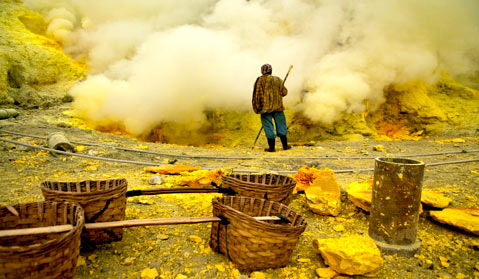
Monday, May 7
Where Heaven Meets Hell at 7 p.m.
Had this film merely shown the stunning scenes of Indonesian miners hiking for miles into the pit of an active volcano to harvest basket loads of sulfur amidst clouds of choking earthly exhaust, it would have been as eye-opening as anything of the last few years. But Where Heaven Meets Hell goes deeper, looking into the lives of three of these miners from East Java, where a swirl of poor villagers, wealthy tourists, Hindus, Muslims, and kids who pay to attend basic school. They all talk about getting out of the dangerous business — except for the mine’s owner, a Chinese man who says that sulfur is safe to eat but then makes his helper actually try it on camera — but the lens keeps winding up on a man who’s worked there 35 years and others who have pads of black skin on the back of their shoulders. These men will likely find a similar fate, and their families aren’t exactly satisfied with that reality.
Hell and Back Again at 9 p.m.
A couple years ago, economics expert-turned-war photographer Danfung Dennis brought a video camera with him to Afghanistan and caught Echo Company of the Marine Corps in the midst of some serious battles. When he learned that Nathan Harris, one of the soldiers he connected with, had come home with serious injuries, Dennis reconnected, and gained access to perhaps the best combined look at the confusion of war and the physical/psychological toil it leaves on warriors. Aside from fatal battle scenes and shots of soldiers trying to reason with Afghans over clearly unreasonable situations, this documentary shows how, for returning soldiers, even parking lots and fast food drive-thru lines turn into stressful activities. With Afghan war footage and audio creatively interspersed with scenes back home in North Carolina, we see Harris — who readily admits “all I ever wanted to do since I was 13 was kill people” — fumbling through re-entry with society, with his only hope to get his leg fixed and return to the action.
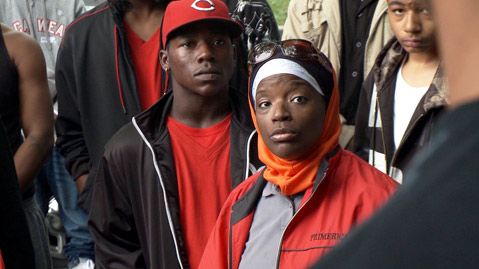
Wednesday, May 9
The Interrupters at 7 p.m.
With young people being murdered in Chicago at unimaginable rates, an epidemiologist enlisted a bunch of former and some current gang members to form the nonprofit CeaseFire in 2000, with the goal of reducing murders by treating violence as a disease and “interrupting” the cycle before it starts again. To do so, these volunteers reach out to victims of violence and their friends to squash retaliation killings with rational, cathartic conversation before they happen. This film looks at three of these “interrupters,” how their work has changed their lives and the people they serve, and puts both the best and the worst of Chicago on full display. Expect to see plenty of gritty ghetto violence — butcher knives, concrete blocks, and 4x4s as weapons, and way too many very young kids gunned down in the crossfire — but also lots of redemption, forgiveness, and hope.
Payback at 9 p.m.
Documentaries about debt aren’t designed to pack theater houses, but this one — which is ostensibly based on Canadian essayist Margaret Atwood’s book of the same name — quickly gets your attention with an intimate look at the tradition of revenge killings in Albania. Debt, it turns out, isn’t just about what you owe your credit card company. Rather, it’s a concept that’s persisted throughout human existence, and this film uses tomato growers seeking equal rights in Florida, the Deepwater Horizon spill in the Gulf of Mexico, and an imprisoned addict who burglarized an elderly woman — not to mention plenty of Atwood herself — to illustrate that point. It’s unconventional and somewhat-successful at clinging to a central theme, but if thought-provoking was the goal, it’s surely a success.
4•1•1
The 2012 Human Rights Film Festival screens on Monday, April 9, and Wednesday, April 11, at UCSB’s Pollock Theater. Additional films will be shown April 23, April 25, May 7, and May 9. For tickets, call (805) 893-3535 or see artsandlectures.sa.ucsb.edu.



